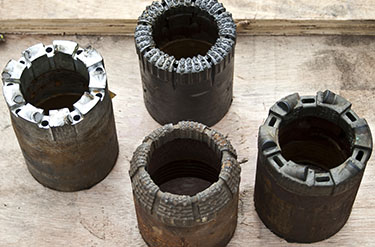To understand basic core drilling components and requirements, you must familiarize yourself with various drilling tools. This part of the guide aims to throw light on this aspect of drilling.
Different Types of Drilling Equipment
For successful core drilling, you need equipment that ensures the best results from your endeavours.
Other factors such as coolants, RPMs, and feeds with the diamond bit or drill should also be taken into account. Remember even the best quality diamond drills will fail when paired with the wrong equipment.
Use them with equipment such as
- Drill Press
- Milling/CNC Machine
- Hand Held or Angle Grinder
- Air High Speed Spindle
- Hand Held or Cordless Grinder
So who uses drill equipment such as CNC Machine or Drill Press? These are industrial manufacturing units, R&D departments, homeowners, hobby enthusiasts, and contractors. They use drills of the handheld variety, angle grinders, drill presses, and drilling rigs.
Various Applications
How often will you be using your diamond bits or drills? What specific tasks do you need them for? Your answers will help you determine your drill requirements.
These bits and drills have a wide application:
a) Production & Industries
They are part of standard equipment in many production and manufacturing operations. These include aerospace composite application, ceramic parts technical or advanced machining, countertop stone fabrication, and lens optical machining.
Machinists and engineers demand a high level of consistency, accuracy, and yield from their drill bits. For heavy-duty applications involving thousands of drillings per day, sintered metal bond drills are ideal.
b) Craft & Hobby
When it comes to art and craft projects, diamond bits or drills come in handy for working with glass, river rocks, beads, jewelry and lapidary.
One thing these applications have in common is that you can use these drilling gadgets occasionally for specific requirements and then keep them stored away.
For, something less than 100 holes, use nickel bonded electroplated drill. These are ideal for beginners since they are more forgiving to mistakes and errors.
Save time money and frustration, by choosing the right drill for your projects.
c) Research and Development
Whether it’s about drilling holes or obtaining core samples, nothing tests the limits of diamond bits or drills more than research and development.
The field is diverse and so are the requirements of researchers.
Research applications involve numerous fields such as advanced materials, material science, geology, optics, metallography, and technical/advanced ceramics.
Also, breakthroughs and new fields such as Nano, Biotechnology, and MEMS use such drilling equipment for various applications.
Typical application scenarios include
- Commercial Laboratories
- Large organization R&D
- Government Laboratories
- Military Research
- Universities
- Science & Space
As the core drilling requirements increase, diamond bits and drills are available at increasing levels of quality, ensuring the best results for various projects.

